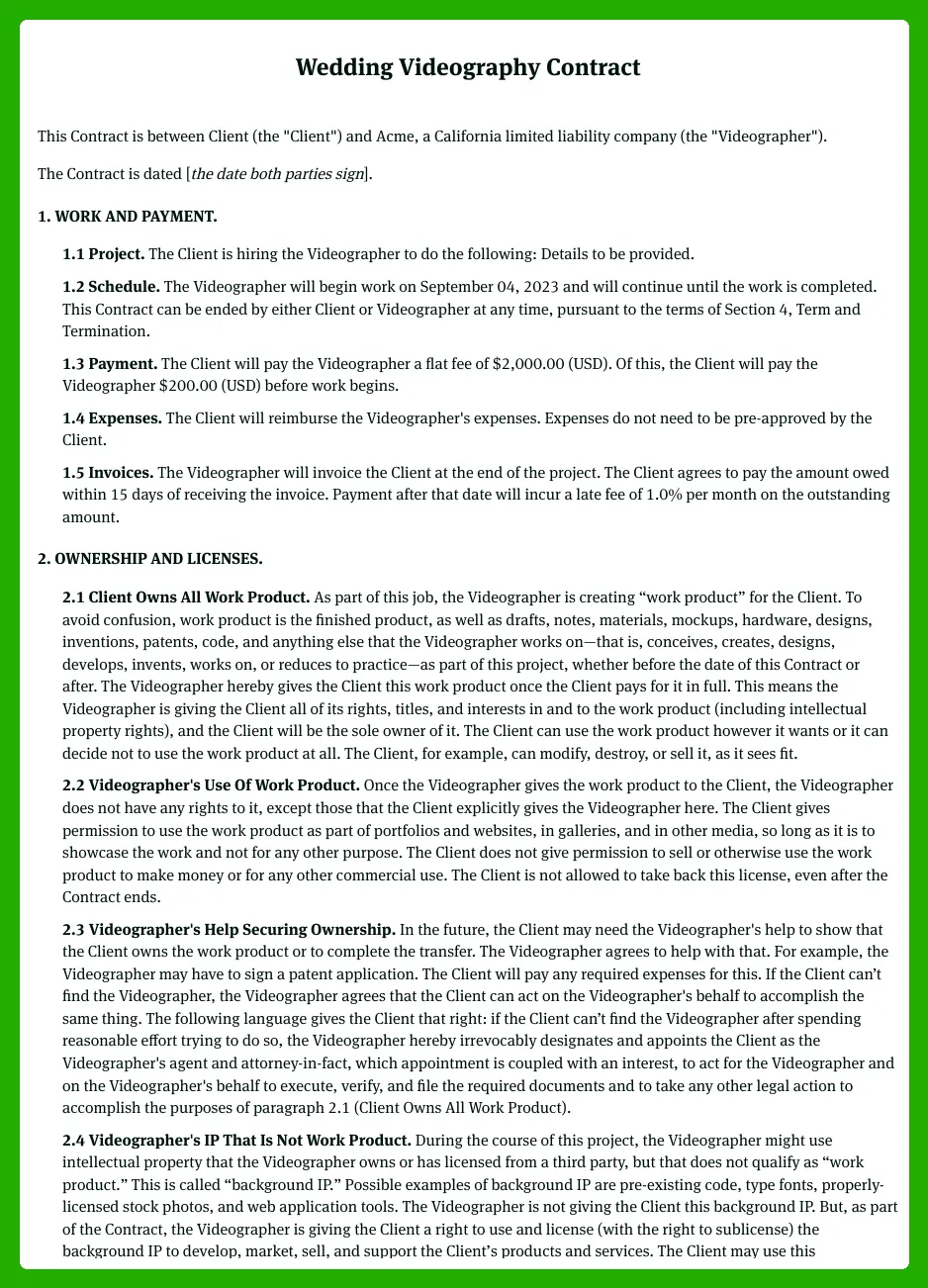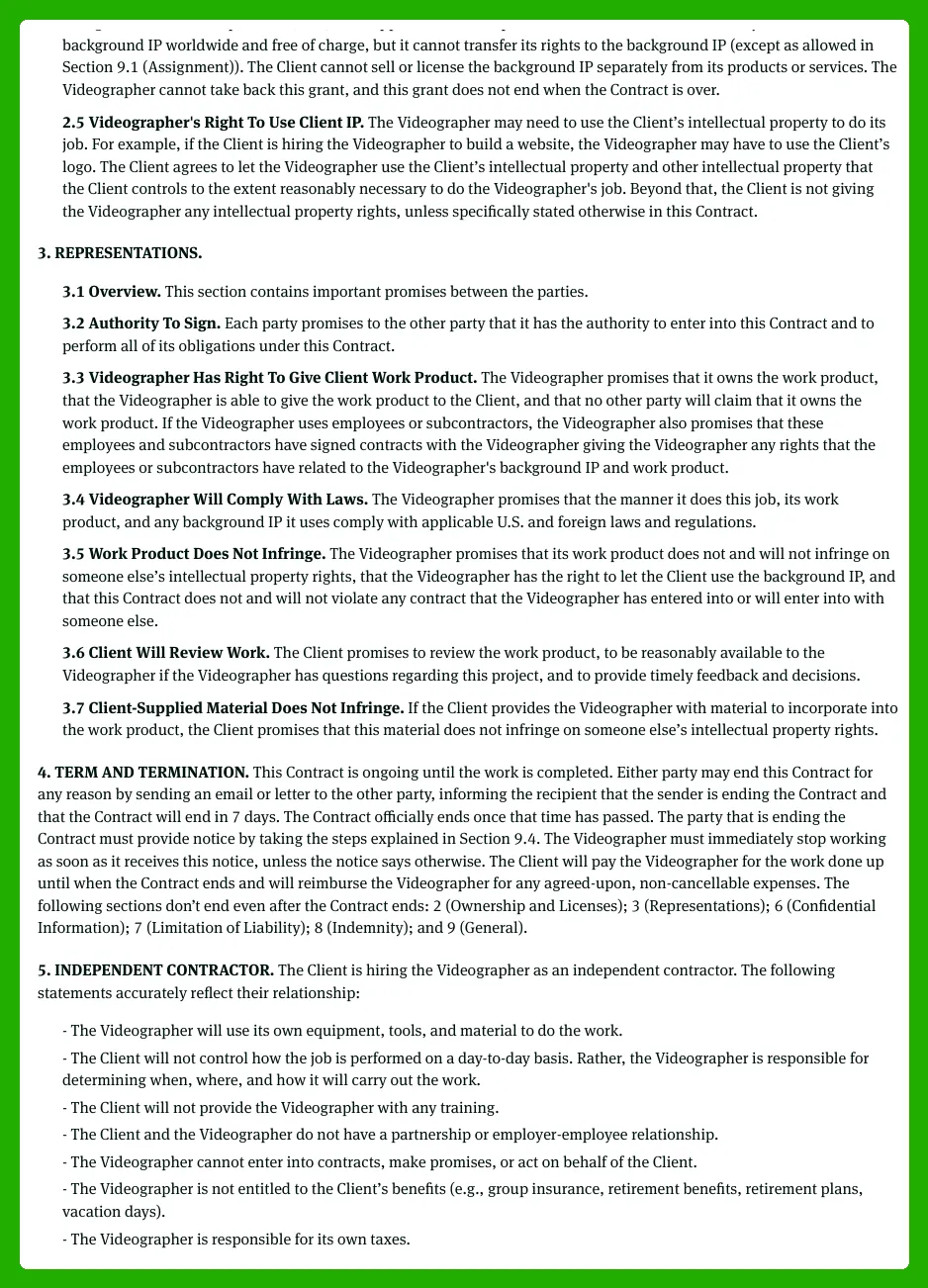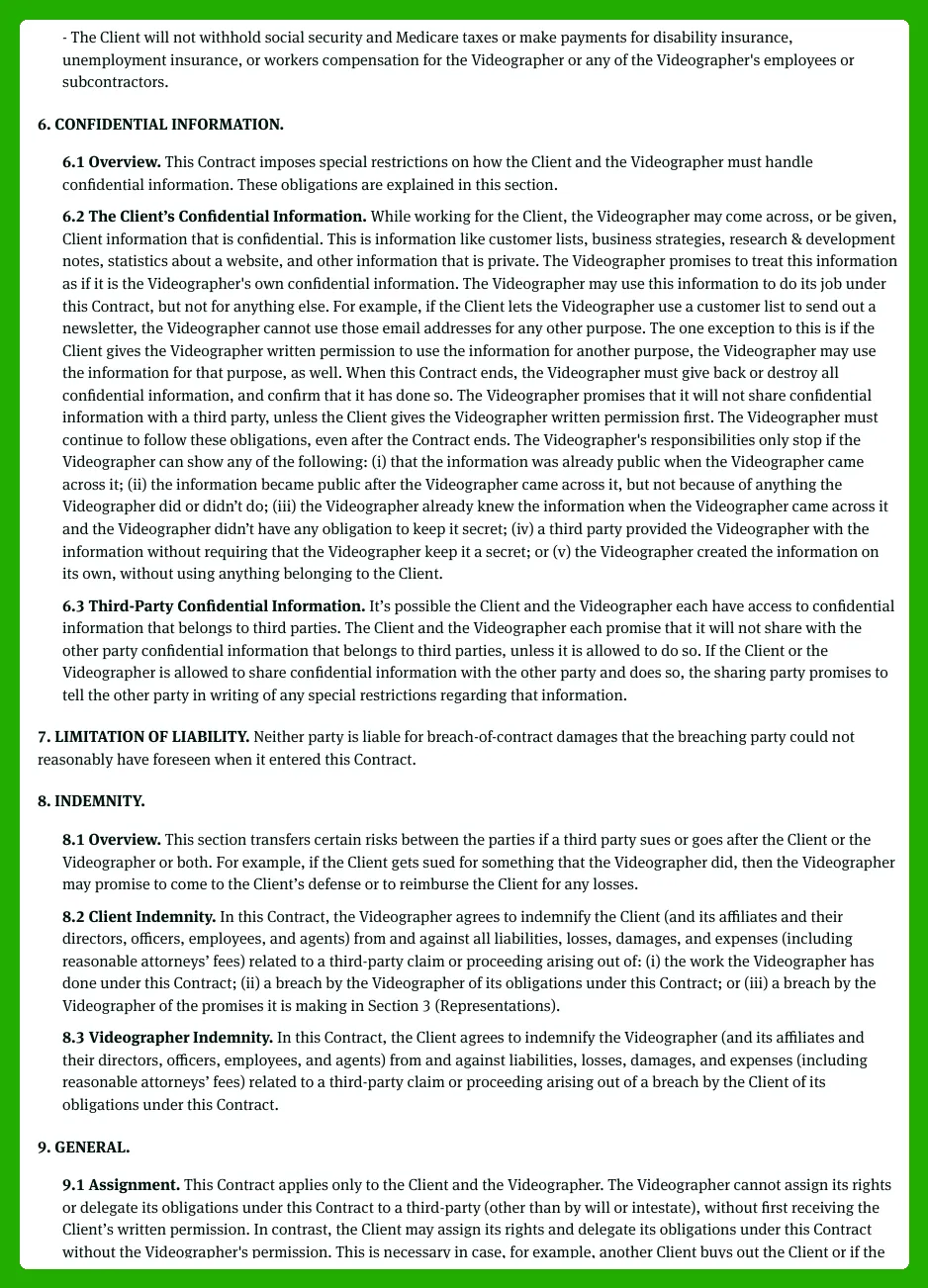What is a Wedding videography contract?
As a wedding videographer, you are a special part of the wedding couple’s day. Capturing video footage is just as important as the photographs that get taken of the couple and their wedding party.
Wedding videography has become increasingly popular over the years as video quality has improved and advanced. To date, the average cost of a wedding videographer in the U.S. is $1,799. That’s a lot of money for a single supplier so your clients are going to have high expectations from the beginning.
A wedding videography contract is an agreement between the videographer and the client who hires them to shoot and edit a video of the wedding. This contract will often detail the wedding couple’s requests on desirable shots they’d like included and other relevant requirements.
As a freelancer, this contract will also include the costs of your services and any relevant clauses.
Note: For access to wedding video contracts, as well as other services, you can find them all at Bonsai. Sign up to Bonsai today for both free and premium access to this online platform. It’s perfect for both self-employed freelancers and small businesses.
What to include in the Wedding videography contract
When creating a wedding videography contract, there are some key things that are important to include. This help ensures both you and the client you’re working with knows exactly what to expect.
Here are some must-haves to include in a wedding videography contract template.
Basic contact details and agreed package prices
When drafting up a wedding videographer contract template, you’ll start with the basic contact details. This is your contact details, such as your name, address and business details where applicable.
You’ll also want to get your client’s information so that this can also go on the document too. Make sure that both contact details are present and correct for both parties.
The agreed package price should also be highlighted in this section. As a wedding videographer, you might have a number of different packages, so it’s important to clarify which one the client is receiving. Make sure to double check this as you don’t want to go offering packages that are worth a lot more than the agreed price!
Be clear on what’s included in each of the packages on the wedding videography contract also. You might already have it detailed on your website or portfolio, however it’s worth reminding the clients and having it written into the contract.
The deliverables as a wedding videographer
Another essential element in your wedding videography contract template is your deliverables as a supplier. Your services as a videographer might be different from others within your field. That’s why it’s important to detail everything you’ll be providing to your clients.
Before you do this, it’s worth sitting down with the wedding couple, whether it’s in-person or remotely to understand what it is they’re after. There might be limitations to what you can do or there may be upgrades/upsells that you can provide as part of the service overall.
When writing your wedding videography contract, it’s good to relate your deliverables to the location of the wedding ceremony and wherever the reception is taking place. For example, you may want to understand the wedding couple’s requirements for each of these venues in terms of footage.
A loose timeline or plan of the day
It’s not something that has to be entirely accurate but it might be worthwhile putting in a timeline or plan of the day. As a wedding videographer, you have a role to play and it can be handy for the client to know what you’ll be doing throughout the duration of your time at the wedding.
This can be helpful for the wedding couple to plan accordingly and to have a good idea of what to expect from you when the big day arrives.
Wedding videographers like photographers require structure and so it’s good to put a loose timeline in your wedding videography agreement.
Payment expectations
In order to ensure you’re paid on time, it’s a good idea to lay out your payment expectations for the client. Typically there’s a deposit that needs paying and then usually the final balance is paid three to six months prior to the wedding day.
However, you may choose to operate slightly differently and so it’s worth beating to the tune of your own drum when including this in your wedding videographer contract template.
Make sure you incorporate this into your wedding videographer contract, especially as wedding couples will have a lot of expenditures that they’re committed to closer to the day itself. You want to ensure they pay on time and if not, you have a payment agreement in place to chase for late payments.
Standard clauses for both parties to agree to
There are some standard clauses that will come with any contract but can be specific to the role in question. After all, it’s important to protect the interests of both parties when creating a contract that both will need to sign.
For your wedding videography contract template, here are a couple of standard clauses that you could add in.
Shooting exemptions - This could be in any scenario where a wedding guest does not want to appear on camera. A clause that states you to be exempt from video recording certain guests can help protect your reputation and respects the privacy of those who don’t want to be filmed.
Creative control - When hiring a videographer or photographer, the creative control ideally remains with the professionals. It can also prevent any unwarranted opinions or involvement from the wedding couple themselves.
When writing up your wedding videography contract, consider how strict or loose you are with creative control. You don’t want to give away too much of it!
Use of images - A wedding videographer may want to retain all of the copyrights of their imagery. This is something that may not be negotiable between the videographer and client. However, there might be certain clauses you want to mention that prevent or allow the resale or distribution of the wedding photos.
This is a good clause to put in your wedding videography contract, especially as some wedding couples may try to sell the images to others.
Booking fees and cancellation costs - Not every wedding is plain sailing and sometimes a cancellation or two may happen. With that said, a clause in place regarding cancellations is crucial. This is due to securing a date for the client and having them cancel last minute could mean a loss of money on your part.
Booking fees are also often useful to outline too where required. When it comes to your wedding videography contract template, it’s good to incorporate all of the relevant clauses that keep you and your work safe!
How to write a Wedding videography contract
Having a wedding videographer contract template can make everything a lot easier. You don’t need to worry about creating a structure when a premade template already has that covered. With a wedding videography contract template, you won’t forget anything that is vital to include.
When writing a wedding videography contract, it’s important to be clear and concise. If you’ve never created a wedding videographer contract before, then here are some tips.
Speak to the clients beforehand
Always speak to your clients first before filling out a wedding videography contract template. Every wedding couple is different from the next and so you can’t just create a generic videography contract that works for everyone.
Understanding each client’s wants and requirements will help you fill out the contract easily and as a result, there’s less back and forth between clients. When there’s multiple drafts of one contract, it can get confusing and can lead to misunderstandings between parties.
As a wedding videographer, it’s good to meet your client first and foremost. You should be in contact with them closer to the time. Your wedding videography contract should be sent once you’ve had that initial meeting.
Use Bonsai for a wedding videography contract template
As far as wedding videography contract templates go, Bonsai is a great option for those needing pre-made contracts. When creating a contract, why waste your time having to draft one from scratch?
A videography contract is a lot easier when you have a platform like Bonsai to utilize, especially when it provides the core details needed for this type of document already.
Making use of a wedding videography contract sample can be easier than having to make it from scratch.
Customize the wedding videography contract to your needs
A wedding videographer contract template will need customizing. This wil hep ensure that everything you’ve included is also considering your own needs and wants as a supplier.
Whilst you’re providing all the deliverables for the client, it’s also good to protect yourself from having to do any further work. It can be very easy to get your arm twisted by the client or for the client to lie and expect more from you.
When offering videography services as a wedding videographer, you want to be be straight to the point with what you will offer and what comes as extra.
Double check the details
Always double check the detail when it comes to contracts. Weddings are challenging to organize and so you can’t always rely on your wedding couple to read everything word for word. It’s important that you’ve gone over everything with a fine tooth comb before you send it off to the wedding couple.
Ideally, you want to minimize the number of amendments you make, so it’s worthwhile double-checking it all. There are likely to be a number of drafts that you’ll be amending when it comes to your wedding videographer contract but it’ll benefit both you and the client in the long-run.
Send off to the client for signing
Once you’ve incorporated everything you can think of when it comes to your wedding videography contract template, you’ll want to send it off to the client for signing. Be sure to offer the opportunity to sign physically or electronic signature, which is more common nowadays.
It’s always worthwhile setting a deadline of when you want the wedding videographer contract back.
Creating a Wedding videography contract is simple with Bonsai
When it comes to creating a wedding videography contract template, it can be hard work to create a document for every single client. Bonsai is a useful platform for helping cut down the time you’d spend creating these videography contracts. How does Bonsai benefit wedding videographers as well as many other freelancers?
It cuts down the effort and time required
One of the biggest benefits that Bonsai does with a wedding videography contract template is that it saves you time and effort. It’s important that you’re spending more time conducting your videography services, rather than spending it on admin.
Bonsai is a great one for helping draft up wedding videography contract templates quickly. You’ve got instant access to a wedding video contract that you can adapt to what wedding videography services you provide.
As a wedding videographer, your time is precious so a Bonsai contract template can be useful to have.
Bonsai top tip: There are plenty of other services that you can try out as a freelance wedding videographer. Why not track your expenses with Bonsai Tax? It’s great for those looking to effectively manage their accounts when doing their taxes.
A great first impression of professionalism for your clients
When using a wedding videography contract sample from Bonsai, you are using some of the best contracts out there. It’s a great first impression for your clients, especially when pretty much all of your clients are going to be completely new to you and your services.
For a wedding videographer, reputation is important so when you’re providing a wedding videography agreement, you want it to look the part.
Avoids any miscommunication or misinterpretation of the agreement
When writing out a wedding video contract, it can get complicated if you’re writing it from scratch. You may mention something earlier on that overlaps something further down the contract.
A wedding video contract from Bonsai is one that will avoid you missing out any important details. It can also be a helpful guide so that you’re not confusing your client or saying anything that they could misinterpret.
Wedding videography contracts are essential as a wedding videographer. It not only protects you as the supplier but it also provides all of the relevant details that your client needs to know.
Sample Wedding Videography Contract Template
That's a wrap for your wedding videography contract necessities. If you're ready to get your hands on your wedding videography contract template you can sign-up to Bonsai here and get going in a few clicks.
The entire agreement template is available for you to twist and tweak as you see fit, while having a legally vetted bare-bones template you know you can rely on.











.webp)

.webp)




